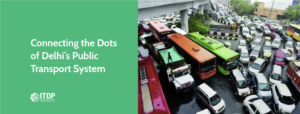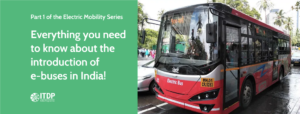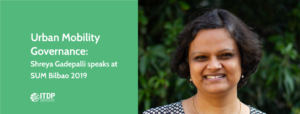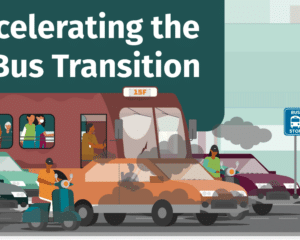Compiled by Aila Bandagi Edited by Keshav Suryanarayanan
International Women’s Day is a global day celebrating the social, economic, cultural and political achievements of women – while also marking a call to action to accelerate gender equality. This year, the theme for the day is #EachforEqual. Women’s equality cannot wait. It is going to take everyone to be conscious and inclusive – all the time, everywhere. The ITDP India Programme is taking steps towards making urban streets and transport safe and comfortable for women.
Compiled by Aila Bandagi Edited by Keshav Suryanarayanan

International Women’s Day
International Women’s Day
Over the last decade, there has been mainstream media acknowledgement of the sexual harassment faced by women and girls in public transport and on streets in cities around the world. The fear of crime is widely recognised as a barrier to public transport use. Yet, our mobility plans continue to remain gender-blind, as they do not measure the level and extent of harassment faced by women and girls. The normalization of harassment puts the onus of safety on women and girls, thereby restricting their behaviour and mobility. The role of transport planning in alleviating or exacerbating sexual harassment and violence has not yet percolated within mainstream discourse and into the minds of decision-makers.
While mainstream media has focused on gruesome incidents such as rape, violence against women and girls also includes groping, molestation, staring, stalking, stealing, cat calls and acid attacks. In Delhi, a 2010 study with over 5000 men and women showed that over 95% of the women had experienced harassment in the past year and public transport, buses and streets were identified as the most vulnerable spaces. While women of all ages faced some form of violence or sexual harassment, school and college girl students in the 15-19 age-group were the most vulnerable. In Mumbai too, 95% of the women respondents reported sexual harassment, 46% reported facing harassment inside buses and 23% while waiting at bus stops.
Sexual harassment is prevalent and underreported, both in developed and developing countries. In New York City, it is estimated that 96 percent of women face sexual harassment and 86 percent of sexual assaults in the subway system are unreported. Similarly, in Baku, Azerbaijan, while 80 per cent of 200 women surveyed had faced sexual harassment in the metro, none of them reported it to the appropriate authority. In Brazil, it is acknowledged that more than half a million women suffer some sort of sexual violence, every year.

Cities need to collect gender disaggregated data and measure sexual harassment on their streets and in the four legs of the public transport journeys to develop clear actions. These can range from reserved seats, permitting women, girls, and the elderly to board or alight from buses in between stops in the night, providing real time information on the arrival of public transport vehicles amongst others. The gender disaggregated quantitative data from travel surveys must be complemented with focus group discussions to understand men and women’s perception and experience of the public transport journey across socio-economic groups.
Gender safety audits must be mainstreamed in the assessment of transport infrastructure. Safety audits evaluate the physical and social aspects in creating safer streets. The results of the audits provide valuable information to improve the quality of walking infrastructure and crossings, continuous and consistent street lighting, access to facilities such as public toilets, increasing “eyes on the street” (through police personnel, patrolling vans, men or women street vendors) and designing inclusive streets.
Transport service providers, bystanders and police personnel must be interviewed to understand their awareness of the frequency and causes for sexual harassment and their role in preventing or addressing it. Behaviour change is a long process involving progressive legislation, law enforcement and change in social norms. However, cities can create standard operating procedures along with gender sensitization workshops to train the police and transport workers / operators to prevent and address sexual harassment. Cities can create campaigns to communicate a zero tolerance approach to sexual harassment, encourage women and girls to report incidents of sexual harassment and bystanders to intervene. Women need to be at the centre of the planning, implementation, monitoring and evaluation of transport policies and projects as partners, professionals and as decision-makers.
The ITDP India Programme has led work in India to address the issues of safety, comfort, convenience and affordability of urban transport. Even though women use public transport modes for four out of five work trips, surveys indicate that they feel most vulnerable in public transport and public spaces. In the next few years, cities will need to make a concerted effort to improve women and girls’ experience of sustainable modes of transport to achieve a target of 40 percent of all trips. To address this, as a first of its kind, the ITDP India Programme and Safetipin created a policy brief on Women and Transport in Indian Cities.

The policy brief fills this gap by providing a framework to integrate technical and social, quantitative and qualitative approaches for enabling this transition. If women perceive public transport and public spaces as unsafe, it affects their access to work, education, and social opportunities. The brief provides recommendations on policy interventions to improve walking, cycling, and public transport for women.
In line with the theme of this year’s International Women’s Day, the ITDP India Programme is proud to continue to work towards making transport systems safe, accessible, and reliable for women. A city safe for women, is a city safe for all. We are proud to be involved with female change-makers and organisations from across the world working towards making this a reality.
Recent Blogs

Connecting the Dots of Delhi’s Public Transport System
Find how the intricate network of Delhi’s public transport system and its ongoing efforts enhance connectivity, improve accessibility, and provide a seamless travel experience for millions of commuters in the bustling metropolis.”
Pune, Coimbatore and Chennai Selected as India’s ‘Smart Cities’
Pune, Coimbatore, and Chennai emerge as India’s Smart Cities, paving the way for sustainable urban development and innovative solutions. Explore their strategies and initiatives towards building smart and livable cities for the future.
Recent Blogs

Everything you need to know about the introduction of e-buses in India!

E-mobility: a game-changer for Informal Public Transport in India

